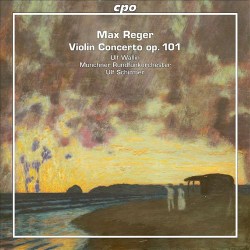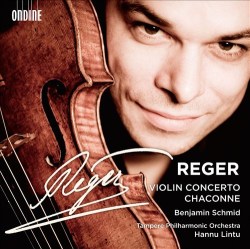|

Support
us financially by purchasing this disc from |
|
|
|
|
|

Support
us financially by purchasing this disc from |
|
|
|
|
|
|
Max REGER (1873-1916)
Violin Concerto in A major, Op.101 (1908) [56:26]
Suite in A minor Op.103a: Aria for violin and orchestra (1908) [4:54]
Ulf Wallin (violin)
Munich Radio Orchestra/Ulf Schirmer
rec. January 2011, Munich, BR Studio1
CPO 777 736-2 
[61:24]
Max REGER (1873-1916)
Violin Concerto in A major, Op.101 (1908) [53:31]
Preludes and Fugues: Op.117 No.4 Chaconne (1910) [10:12]
Benjamin Schmid (violin)
Tampere Philharmonic Orchestra/Hannu Lintu
rec. April 2012, Tampere Hall
ONDINE ODE1203-2 [63:56]
Regerians can rejoice that two recordings of the Violin Concerto
appear at the same time, though they were recorded over a year apart.
Swedish violinist Ulf Wallin has gone to Munich to record his version,
whilst Austrian fiddler Benjamin Schmid has travelled to Finland.
Thus, in a geographical switcheroo, Austro-Germany and Scandinavia
are entwined in an effort to promote Reger’s long and sometimes
thorny Concerto.
Which recording to get? Readers who are attracted to Reger’s
music- it was news to me that he was seven foot tall, as one set of
notes tells us - will know that Wallin is the reigning violin propagandist
on disc for the composer’s music. Only recently I reviewed his
recording of the Violin Sonatas, and his playing, as ever, was superbly
persuasive and idiomatic. Schmid is the lesser-known Reger player,
though he’s clearly been working on the concerto for some time.
His repertoire is eclectic and I’ve reviewed his Paganini/Kreisler
and Korngold discs.
Fortunately he and Wallin take distinct positions in this concerto,
and those are mirrored by their respective conductors and the sound
quality of the two labels. Wallin has a taut, silvery tone, one of
considerable purity and not overmuch breadth. Schmid is the more obviously
glamorous player, with a rich sheen to his tone, and his expressive
position changes are the more self-conscious. Wallin, therefore, plays
with more intimate romantic innocence, if you will, and Schmid with
more public self-confidence. This, to an important degree, defines
their approach to the work.
The long first movement is the most problematic of the three. It’s
as long, or even longer, than the other two movements combined, in
much the same way that the Elgar Concerto, written only a couple of
years later, reverses the idea with its long finale. It’s really
a question of which expressive position you prefer in this work and,
in the central movement, whether you prefer Wallin’s more relaxed
tempo or Schmid’s somewhat more hasty one. The nature of the
‘con gran espressione’ Reger demands will also affect
your position. In terms of gesture, Schmid is the more obviously emotive,
but Wallin’s greater tempo breadth lacks nothing in communicativeness.
In the finale Schmid turns the tables and outpaces Wallin, bringing
the ‘ma con spirito’ indication to life. Hannu Lintu is
as one with his soloist here, but then Ulf Schirmer responds similarly
to Wallin, for whom a certain doggedly amusing rhythm is the platform
for the finale’s wit. For Wallin, it’s the manipulation
of Regerian rhythm that conveys the spirit; for Schmid it’s
rather more terpsichorean energy.
There are the two fillers to consider, both with Bachian elements.
Wallin plays the Aria extracted from the Suite in A minor
Op.103a. Adolf Busch, that most devoted performer of the composer’s
work, played it at Reger’s funeral. Schmid plays the more extensive
and interesting, to be frank, Chaconne from the set of Preludes
and Fugues, Op.117.
A word about sound quality: CPO’s SACD sound has necessary breadth
but it is very detailed. This clarity suits the performance. Ondine’s
sound is rather warmer, and, again, and not coincidentally, this suits
Schmid’s more overtly romanticist approach to the concerto.
I don’t feel I’ve helped with a selection. Add to the
mix Kolja
Lessing’s Telos disc of the concerto and Tanja
Becker-Bender’s Hyperion disc and we have a real conundrum.
I do however think these two newcomers are the best of the recent
quartet. In the end it’s an expressive question and if a choice
is required, then my own preference is for Wallin and Schirmer.
Jonathan Woolf
|



 All Nimbus reviews
All Nimbus reviews








